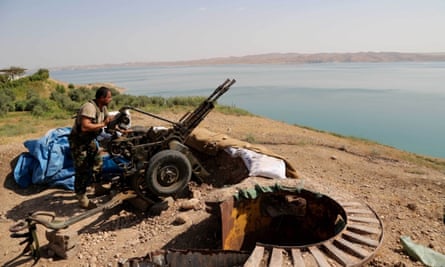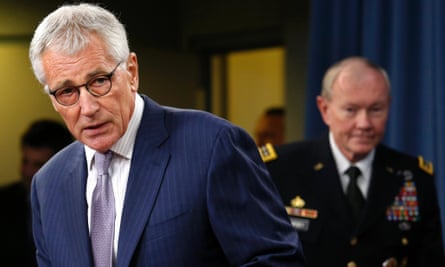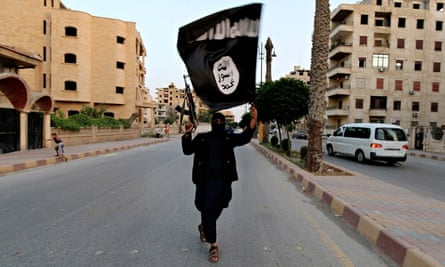Senior Pentagon officials described the Islamic State (Isis) militant group as an “apocalyptic” organisation that posed an “imminent threat” on Thursday, yet the highest-ranking officer in the US military said that in the short term, it was sufficient for the United States to “contain” the group that has reshaped the map of Iraq and Syria.
Army general Martin Dempsey, chairman of the joint chiefs of staff, told reporters in a Pentagon briefing that while Isis would eventually have to be defeated, the US should concentrate on building allies in the region to oppose the group that murdered an American journalist, James Foley.
“It is possible to contain them,” Dempsey said, in a Pentagon press conference alongside the defence secretary, Chuck Hagel. “They can be contained, but not in perpetuity. This is an organisation that has an apocalyptic, end-of-days strategic vision which will eventually have to be defeated.”
Dempsey’s comments came a day after the secretary of state, John Kerry, said Isis “must be destroyed” following the killing of Foley, the first American known to have died at the hands of Isis. President Obama had referred to the organisation as a “cancer”. Their remarks raised expectations that the administration was preparing for a wider war aimed at wiping out Isis, rather than stopping its advances in Iraq.
Internal administration deliberations over a response to Isis continue, and US officials predicted that there would be little departure from the strategy of limited airstrikes launched since 8 August. One said the military plan “may ultimately evolve”.
John Allen, a retired marine general who commanded the Afghanistan war from 2011 to 2013, called on Barack Obama to order the destruction of Isis. In an op-ed for the DefenseOne website, he urged the president to “move quickly to pressure its entire ‘nervous system’, break it up, and destroy its pieces”.
On Wednesday, six new airstrikes continued to hit Isis positions near the Mosul Dam, three days after Obama declared that it was no longer under Isis control. Nearly two-thirds of the 90 US strikes since 8 August have taken place near the critical dam.

In a grisly video produced by Foley’s captors, his killer says Foley’s death came as revenge for US airstrikes in Iraq. Soon after the video was released, the US confirmed that it had recently mounted a failed rescue bid for Foley. Elite US military forces secretly invaded Syria earlier this summer in a mission that involved dozens of special operations forces from all US military services, including the 160th special operations aviation regiment.
US forces flew into Syria in defiance of air defence batteries that senior military officials have described as highly threatening to pilots. Modified Black Hawk helicopters were involved, and “armed fixed-wing aircraft and drones” provided cover to forces on the ground, said an administration official. No hostages were found at the targeted location.
It emerged on Thursday that Foley’s family received a message from Foley’s captors on 13 August, warning them that he would be killed. They passed the message on to the US government, which helped with a response. Phil Balboni, chief executive of GlobalPost, the Boston-based online news publication that had published work by Foley, told Reuters: “It was an appeal for mercy. It was a statement that Jim was an innocent journalist,” and that he respected the people of Syria, where he was held.
Foley’s family and friends hoped the militants were bluffing and wanted a ransom, he said. The group had last year demanded a ransom of $132m for his rescue, Balboni said.
Disagreements within the administration are emerging about how to deal with Isis, both on what the goals are, and how to achieve them.
Hours after a senior White House foreign-policy official, Ben Rhodes, said the US would not be limited in its response by “geographic boundaries”, Dempsey assessed that cross-border action was necessary to defeat the group. At the same time, he tamped down speculation that US warplanes would strike Isis in Syria as well as Iraq.
Isis “will have to be addressed on both sides of what is at this point essentially a non-existent border”, Dempsey said, which would require “a variety of instruments, only one small part of which is airstrikes. I’m not predicting those will occur in Syria, at least not by the United States of America.”

Dempsey, an Iraq veteran, has long been sceptical of US military involvement in the Syrian conflict, citing among other reasons the threat to US pilots from dictator Bashar al-Assad’s air defences. He has frustrated those who advocated American involvement in the two neighbouring wars, such as hawkish Republican senator John McCain, who in June called on Obama to fire Dempsey, saying he “has done nothing but invent ways for us not to be engaged”.
Echoing the White House’s stated position, Dempsey said the US needed “a coalition in the region that takes on the task of defeating Isis over time”, something the administration this week has put effort into broadening and strengthening. But the group’s ultimate defeat, the general said, would only come “when it is rejected by the over 20 million disenfranchised Sunnis that happen to reside between Damascus and Baghdad.”
The senior Pentagon leadership’s rhetoric on Thursday about the threat Isis poses was as intense as its proposed options for confronting Isis were sanguine.
“When we look at what they did to Mr Foley, what they threaten to do to all Americans and Europeans, what they are doing now, I don’t know any other way to describe it other than barbaric,” Hagel said. “They are an imminent threat to every interest we have, whether it’s in Iraq or anywhere else.”
Hagel said Isis, also kown as Isil, which began as al-Qaida’s Iraq affiliate before being disavowed last year over its brutality, was a calibre above previous terrorist organisations the US has faced.
“Isil is as sophisticated and well funded as any group that we have seen. They’re beyond just a terrorist group. They marry ideology, a sophistication of strategic and tactical military prowess, they are tremendously well funded. Oh, this is beyond anything that we’ve seen, so we must prepare for everything,” Hagel said.

The apparent discrepancy between the Obama administration’s assessment of Isis’s virulence and its limited air strikes against the group have prompted confusion about what Obama is trying to achieve. The 90 airstrikes launched since 8 August have “stalled” Isis’s momentum, Hagel said.
“Right now, it appears to be the goal is to use minimal American force, primarily air power, to contain Isis and hand the problem off to Iraqi and Kurdish forces,” said Peter Mansoor, a retired army colonel who served as executive officer to General David Petraeus during the 2007-2008 troop surge, a rare period of tactical US achievements in Iraq.
“To me there is a significant mismatch between the goal of defeating Isis in the long run and the tools to achieve that goal.”
Mansoor, now a military history professor at the Ohio State University, said he agreed with Dempsey that defeating Isis required Sunnis in Iraq and Syria to turn on it, but “Isis has proven themselves too strong, too virulent and too violent to enable local inhabitants to rise up and cast it off without significant help from the outside.
“European nations are asking the United States for leadership in developing a plan for defeating Isis, and this administration is failing in its duties to protect the American people if it doesn’t create an alliance that can not just contain Isis, but destroy it.”